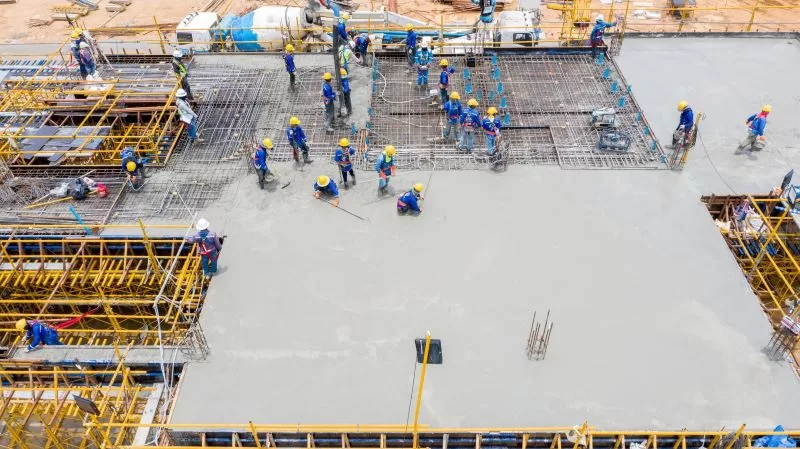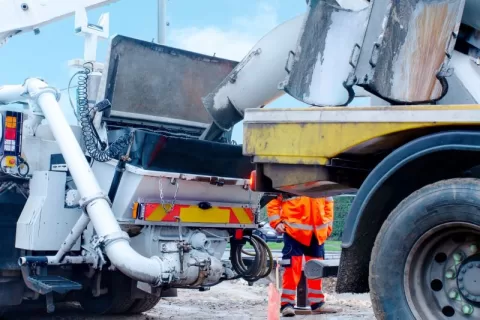Concrete pumps are essential tools in modern construction by streamlining the process of transporting liquid concrete to various parts of a construction site. These machines are indispensable for their efficiency and ability to maintain the quality of concrete by ensuring a steady, controlled pour. By understanding the different types of concrete pumps, their benefits, and applications, any construction project can ensure optimal usage and effective results.
Read on to learn what are the types of concrete pumps, their benefits, and their applications.
Different Types Of Concrete Pumps
Concrete pumps come in various types, each designed to meet specific needs and challenges in construction projects. The primary categories include:
Boom Or Truck-Mounted Pump
Boom or truck-mounted pumps are integral to large-scale construction efforts, featuring a truck or semi-trailer with a robotic arm, or boom, that extends to deposit concrete with precision. This type of pump is invaluable for projects that require concrete to be delivered at high altitudes or deep foundations, as it can pump concrete at high volumes and speeds.
Also, it’s especially useful in constructing high-rise buildings, bridges, and other large structures. For instance, the ability of the boom to extend and maneuver around obstacles ensures flexibility and increases safety on the construction site by minimizing the need for manual labor in dangerous areas.
Stationary Or Trailer Concrete Pump
Stationary or trailer concrete pumps, commonly known as line pumps, are mounted on trailers and utilize a series of hoses and pipes to transport concrete to specific locations. This method is highly effective for projects with limited access or where space constraints can prevent larger equipment from being used. These pumps are particularly suited for residential construction projects, including homes and pools, where precision is needed without the disruption of large machinery.
Furthermore, the flexibility of the hose setup allows for concrete to be placed in backyards, indoors, or in other confined spaces, ensuring that even the most intricate designs are achievable. Hence, for construction companies seeking to invest in modern pumps like stationary or trailer concrete pumps, it’s important to choose a company like Jaws Concrete Pumping which offer professional services with a fleet of modern pumps. This way, they can ensure their project’s needs are met with the highest standards of efficiency and reliability.
Specialized Usage Pump
Specialized usage pumps cater to niche applications in construction that require specific concrete placement techniques, such as in tunnel construction or in scenarios demanding high-pressure pumping. These pumps include skid-mounted units often employed in mining operations or inside factories where concrete transport to elevated or extended distances is needed. Their design also allows for operation in rugged environments and can overcome the challenges of pumping concrete at steep inclines or through complex, pre-established pipe networks. The robust nature of these pumps ensures reliability in demanding situations, ensuring continuous operation and minimal downtime.
Rail-Mounted Concrete Pumps
Rail-mounted concrete pumps are specialized equipment used primarily in pre-cast factories where the same path is repeatedly followed for concrete placement. These pumps are mounted on rails to facilitate the smooth and efficient movement of concrete from one mold to another within the factory setting. This setup enhances production speed and consistency, allowing for the rapid casting of multiple pre-formed concrete elements such as panels, pipes, and slabs.
Moreover, the rail system’s precision and control reduce waste and increase the quality of the finished products, making it an essential tool for mass production of pre-cast concrete elements.
Benefits Of Concrete Pumps
Concrete pumps offer numerous advantages that improve the efficiency and safety of construction projects. These include:
Speed
Concrete pumps can provide a faster way of transporting concrete than traditional methods, such as wheelbarrowing, which is labor-intensive and time-consuming. Pumps can deliver concrete directly from the mixer to the pour site without intermediate handling. This capability significantly speeds up construction projects by reducing the time spent manually moving concrete, accelerating project timelines and decreasing labor costs.
Reach
Another notable advantage of concrete pumps is their ability to reach difficult areas. These pumps can extend to high-rise structures or deliver concrete to significant depths like foundations or tunnels, areas that might be inaccessible for other equipment. This extensive reach is crucial for projects involving tall buildings or complex architectural designs, ensuring that concrete placement is possible, efficient and precise.
Reduced Labor
Concrete pumps reduce the need for manual labor. By delivering concrete directly to the location where it’s needed, these pumps can eliminate the requirement for multiple laborers to transport and pour concrete, thus reducing labor costs and enhancing job-site safety.
Decreased Wastage
The precision with which concrete pumps operate significantly reduces wastage. Unlike manual transport methods that often result in spills and overflows, pumps ensure concrete is placed exactly where it’s needed. This precision minimizes spills and the amount of unused concrete, thus saving costs and resources.
Quality
Concrete pumps maintain the quality of concrete by ensuring a continuous flow, which prevents the segregation of materials that can occur when concrete is handled multiple times. This is particularly important for maintaining the strength and integrity of the concrete, leading to better structural stability.
These benefits underscore why concrete pumps are an indispensable part of modern construction, ensuring projects are completed faster and with better quality and reduced costs.
Applications Of Concrete Pumps
Concrete pumps have become indispensable in modern construction due to their versatility and efficiency in delivering concrete to various types of projects. Their ability to handle different construction demands makes them crucial across several key areas. These include:
High-rise Buildings
Concrete pumps are essential in the construction of skyscrapers and high-rise buildings. They can pump concrete to significant heights, which is critical for creating the structural framework of tall buildings. Traditional methods would be inefficient and costly, but concrete pumps can enable a continuous and reliable concrete flow to the upper levels, ensuring speed and safety during construction.
Large Foundations
For large-scale projects that require extensive foundations, such as industrial complexes and commercial buildings, the role of concrete pumps is critical. These pumps enable the rapid and uniform distribution of concrete across large areas, a necessity for laying strong and consistent foundations. This capability is essential for maintaining the structural integrity of major constructions to ensure they meet safety and durability standards. Concrete pumps streamline the construction process by eliminating the need for traditional, labor-intensive methods of concrete placement, thus speeding up the completion of foundational work and reducing manpower costs.
Transport Infrastructure
Concrete pumps are integral to constructing transport infrastructure, including bridges, tunnels, and roads. These projects often involve long distances and challenging terrains, where traditional concrete delivery methods fall short. Concrete pumps provide a dynamic solution by delivering concrete directly to the construction site, regardless of obstacles or elevation changes. This ability speeds up the construction process and enhances the quality of the infrastructure by ensuring a consistent and uninterrupted flow of concrete, which is critical for structures that must withstand heavy use and environmental stresses.
Residential Construction
In residential construction, where space is often at a premium and access may be limited, concrete pumps prove invaluable. These pumps allow concrete to be transported through smaller, more flexible hoses, reaching areas that larger machinery cannot access. Concrete pumps are particularly suited for projects in densely populated or confined areas.
By using concrete pumps, builders can efficiently and effectively manage concrete placement in tight spaces, enhancing construction speed and reducing disruptions to the surrounding area, which is crucial in residential settings.
Optimizing Concrete Pump Use
Optimizing the use of concrete pumps involves several crucial steps to ensure their effectiveness and longevity in construction projects. Selecting the appropriate pump type is the first step, influenced by various factors, such as the following:
- Type of Concrete: Different concrete mixes may require specific pump types to handle their consistency and flow characteristics.
- Distance: The distance over which the concrete needs to be pumped, whether vertically or horizontally, determines the required pump capacity and power.
- Site Requirements: The complexity and accessibility of the construction site can dictate the choice between a boom pump, line pump, or other specialized pumps.
Regular maintenance is another critical component, necessary to prevent breakdowns and ensure continuous, efficient operation. Scheduled checks should include inspecting hoses, valves, and other mechanical parts for wear and tear, ensuring the pumping system remains reliable.
Advancements in technology also play a significant role in optimizing concrete pump usage. A notable example is the concrete pump truck. This innovation combines the efficiency of concrete pumps with the mobility of a truck, allowing for the following:
- Versatility: It can be used in varied construction environments.
- Efficiency: It increases the speed and accuracy of concrete placement.
- Flexibility: It ensures accessibility to hard-to-reach areas.
Together, these strategies and tools enable construction companies to maximize the performance and benefits of concrete pumps, enhancing overall project efficiency and quality.
Conclusion
Using concrete pumps in construction projects offers many benefits, from enhancing efficiency to reducing labor costs. With various types available, it’s important to understand the specific benefits and applications to choose the most appropriate one for particular project needs. By investing in the right type of concrete pump, construction projects can achieve faster completion times and higher quality results, ensuring both cost-effectiveness and structural integrity.

